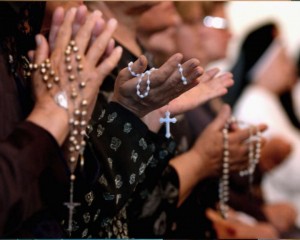Christian Exodus from Iraq Accelerates
 The migration of Christians out of Iraq will accelerate. This was the view held by the head of the Chaldean-Catholic Church, Patriarch Louis Raphael I Sako.
The migration of Christians out of Iraq will accelerate. This was the view held by the head of the Chaldean-Catholic Church, Patriarch Louis Raphael I Sako.
In an interview with the international Catholic pastoral charity, Aid to the Church in Need given on Saturday, June 28th in Ankawa, near Erbil, he said, “When I was in Turkey recently ten Christian families from Mosul arrived. And in the space of only one week twenty families left Alqosh, a completely Christian town not far from Mosul. This is very serious. We are losing our community. If Christian life in Iraq comes to an end, this will be a hiatus in our history.”
The head of the Chaldean-Catholic Church, which is in full communion with Rome, sees the future of Christians in Iraq as being under threat: “In ten years there will perhaps be 50,000 Christians left. Prior to 2003, this figure was about 1.2 million. Within ten years we have shrunk to a community of perhaps four to five hundred thousand faithful.”
The Patriarch, who resides in Baghdad, also regards the disintegration of Iraq as inevitable: “Perhaps there will be a symbolic unit and the name Iraq may continue to exist. But de facto there will be three independent zones with their own budgets and armies.” He shared with other bishops the view that the situation would continue to deteriorate, Sako said. “At present there are three fragments of Iraq, a Sunni one, a Kurdish one and a Shiite one. The Kurds already enjoy autonomy anyway. The Shiites do as well in a sense. Now the Sunnis are following suit. Iraq will therefore be divided up.”
The effects of the disintegration of the state on the country’s Christian community are not yet definitively foreseeable in the view of Louis Raphael I. “To be honest we Bishops are somewhat at a loss at the present time. The future may lie in Kurdistan. Many Christians are already living there after all. But there are also many who live in Baghdad, and there are also some in Basra in the Shiite south. We must wait and see how things develop.”
Sako sharply criticized the behavior of the western states: “They find football more interesting than the situation here or in Syria. Western policy only pursues economic interests. The international community should put pressure on Iraqi politicians to make them find a political solution and form a government of national unity.”
Sako regards the Sunni terrorist organization ISIS as a danger extending beyond Iraq. “ISIS intends to found an Islamic state with oil wells in order to Islamize the world. I think this is a danger for all.” The Patriarch does not discount the possibility of finding a political way out of the present crisis: “Such a possibility will still exist if the west and our neighbors such as Iran, Turkey, Qatar and Saudi Arabia want it to.”

